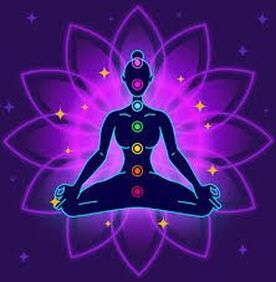 Because so many people ask about it, I have decided to write a bit about the Chakras and how they relate to (my) sound healing. First, let me say that it is important to know that I have not studied this system. And while many people ascribe certain musical notes (and colors) to the individual Chakras, this is not something that is a part of my belief system. However, if you as the client bring an understanding of Chakras to to your session, and a desire to unblock any of them to facilitate better energy flow, I am here to assist you. So with that said lets talk a little about the chakras. What are Chakras? Chakras are an ancient energy system that emerged in the writings of the Vedas, ancient Hindu philosophical texts that were written between 1500 and 500 B.C.E. The Vedas are a collection of poems, hymns, and spiritual writings that impart knowledge of the religion of Hinduism. You may have heard people talk about "unblocking" their chakras, which refers to the idea that when any chakra is "blocked" the attributes of that chakra cannot function properly. When all of our chakras are open, energy can run through them freely, and harmony exists between the physical body, mind, and spirit. There is a certain simple elegance to this idea, and sometimes it is expresses as "being in balance" or "mind/body balance". I myself use these terms often. In India and other parts of the East, beliefs about chakras were included in many systems of healing and spirituality, including Ayurveda, yoga, Hinduism, Buddhism, and others. These systems developed around the idea of a life energy that flows through our bodies and the universe. The use of the chakras is thought to help connect with this life energy in different ways. For example, yoga uses breath and movement to bring energy into the body, and move it through the chakras. Ayurveda uses herbal medicine, meditation, and other practices to open the chakras and balance energy. Chakras became popular in the West beginning in the 1960s-1970s as part of “alternative” spiritual movements. Western traditions that sometimes use chakras include psychology and complementary medicine, as well as spiritual practices. In Hawaiian culture, this somewhat can be seen in the term "ha meaning breath (which is part of the makeup of the word "alo'ha' or breath of life. Oceanic cultures have concepts like "ha" and 'mana' (life force) which resemble in ways the chakras in that there was a common ancient understanding that some mysterious energy runs through us. There is something for sure. We are not just an assemblage of plumbing and scaffolding. Anyway back to the chakras..... What are the 7 main chakras? The chakra system refers to the energy centers it is believed by some that we have in our bodies. There are seven major chakras, each in a specific location along your spine. Let’s look at each one more closely. Root chakra The root chakra, or Muladhara, is located at the base of your spine. It provides you with a base or foundation for life, and it helps you feel grounded and able to withstand challenges. Your root chakra is responsible for your sense of security and stability. Sacral chakra The sacral chakra, or Svadhisthana, is located just below your belly button. This chakra is responsible for your sexual and creative energy. It’s also linked to how you relate to your emotions as well as the emotions of others. Solar plexus chakra The solar plexus chakra, or Manipura, is located in your stomach area. It’s responsible for confidence and self-esteem, as well as helping you feel in control of your life. Heart chakra The heart chakra, or Anahata, is located near your heart, in the center of your chest. It comes as no surprise that the heart chakra is all about our ability to love and show compassion. Throat chakra The throat chakra, or Vishuddha, is located in your throat. This chakra has to do with our ability to communicate verbally. Third eye chakra The third eye chakra, or Ajna, is located between your eyes. You can thank this chakra for a strong gut instinct. That’s because the third eye is responsible for intuition. It’s also linked to imagination. Crown chakra The crown chakra, or Sahasrara, is located at the top of your head. Your Sahasrara represents your spiritual connection to yourself, others, and the universe. It also plays a role in your life’s purpose. Chakra healing in Western science Western science hasn’t studied chakra healing very much and doesn’t have a clear understanding of if or how it works. Most Western research about chakras has looked for links between the chakras and the parts of your endocrine and nervous systems that are near them on your body. For example, scientists might study the pineal gland, a part of your endocrine system, which is in the same part of your body as your third eye chakra (ajna). Some research has tried to measure changes in electrical energy where your chakras are located on your body. Other studies have asked people how they feel after they do treatments to balance or open their chakras. While the scientific connection might not be there fully, most people say that doing practices to balance their chakras helps them deal with stress and anxiety and improves their mental and emotional health. Chakras and Sound Healing There is a belief that each of the chakras has a color and a musical tone associated with it. Because the musical notes come from the west, and are much more modern, this belief likely also developed in the alternative movement of the 60's and 70's thus I cannot promulgate the idea that any specfic note is associated with any specific chakra. However through the processes of entrainment, and the proximity of the bowls and/or forks to the chakra locations, many people report a generalized feeling of well being and unblocking and that's great! If it happens for you that would make me very happy. Sound healing involves going in with no expectation, an open heart and an open mind and let your body and mind do what it is going to do. I invite you to try a sound healing session, bring your struggles and your blockages and lets see what we can accomplish for you. At the conclusion I hope that the experience leaves you feeling relaxed and with a renewed sense of energy and calm. Mahalo
0 Comments
Time for another update. If you would like to see the complete article please go here What to Expect during Lomi Lomi Massage For the past 3 or so years this original blog post, linked above, held the top position in Google. It made sense because the article was written based on years of training and immersion into Lomi, Hawaiian wisdom & culture and what sets this treatment apart. Recently, due to changes in the algorithm I am assuming, other articles are popping up. from AI, generic websites, and from sites that have no understanding beyond lazy copying and pasting of things here and there. This regurgitation of misinformation is disappointing. If you are truly interested in what a Lomi Lomi Massage is like, spend some time reading this site.
I teach this work nationally and internationally on a selective basis. I travel all over the country and in fact the world at the request of clients who bring me to them, and I am happy to help you learn about this remarkable healing experience. Further Reading There is very little information of value, which is still in print, but if you would like to do further reading, I can recommend: Na Mo’olelo Lomi Lomi Makana Risser Chai has written a wonderful reference manual for topics within Lomi Lomi. She lives in Oahu and was also a student of Auntie Margaret Machado. The book is a compilation of interviews and writings from Hawaiian elders collected by the Bishop Museum archives. You will find topics related to traditional healing practices like Lomi Lomi Hawaiian bodywork and La’au Lapa’au, Hawaiian plant medicine, Ho’oponopono and teachings about our Hawaiian spiritual values. The best book I know on the topic. Others if you can find them are here: Good luck in your reserach and I hope to see you.
Mahalo Edward 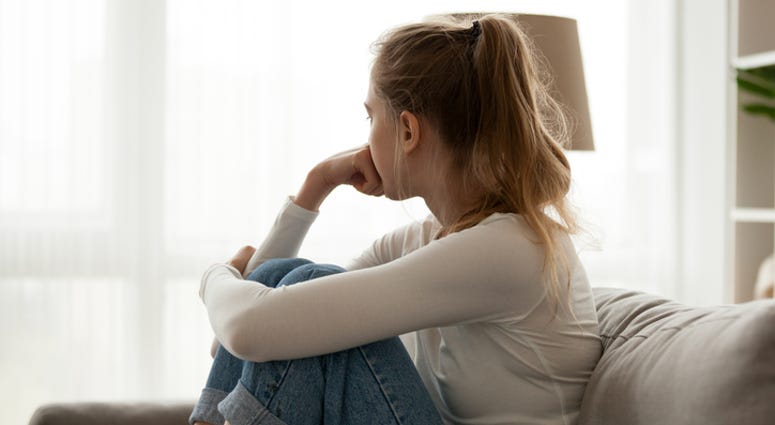 My thoughts began to coalesce around this topic this morning in the shower. As my practice has evolved and I am in a better position to observe the common thread that weaves through it - I have come to describe it as stress management (and mind/body balance). But I think that's a term more familiar to and more narrow to the boomer generation.
Without divulging any confidences of my clients, one thing I have noticed from intake form is the prevalence of medications for anxiety and or depression. Nearly everyone that comes to me is on some form of medication for anxiety and or depression. Granted my practice has never focused on mechanical things; body part repairs, bad backs, etc. so for others it may be different. People get massage for a variety of different reasons. As I peruse internet forums and online conversations to get a better understanding of how other generations view this world (so that I myself may make sense of an increasingly unfamiliar and unhappy place we now inhabit) I see just how widespread generalized feelings of anxiety exist in the population. Without elaborating on the details of the world in 2024; wars housing, economic uncertainly, political polarization, social isolation...etc....etc.... etc. Suffice to say that its easy to see how and why people are in a constant state of worry or panic. This also helps explain the near universal appeal of "nostalgia". People long for a simpler time, whether the experienced it or just imagine it. Our brains are not built for all this worry. Our brains developed and are wired specifically to pay attention to "danger" signals and react. Think being eaten by a sabre tooth tiger, surviving an ambush from a villian. The brain is wired to let non threatening inputs just pass through. However we no longer live as cavemen. The physical threats have mostly vanished but have been replaced by virtual threats, Things we read about, things we disagree with, things we worry over - ALL THINGS BEYOND OUR CONTROL. Worrying about things we have no control over is anxiety. Worrying about things in our past that we cant let go of is depression. I'm not medical and I may have this slightly wrong so please feel free to help me learn, in the comments if you have an informed take. One other fascinating aspect of the brain is that it creates for you this beautiful, textural 3d universe of sights, sounds, colors, feelings, tastes, smells. It literally "creates" the world around you, for you. Yet the brain itself exists in silence and darkness. It never feels the sun, or smells the flower or tastes the nectar - it creates these things for you, from a constant input of basically electrical impulses, that it interprets and weaves this tapestry of the universe for you. The downside is that think about what we choose to fill our brain with and how - Facebook feeds, Instagram scrolls, people looking happier than us, people disagreeing with us, people complaining, on and on and on....so its paints that for you!!!! Yikes So what can you do about it? I ponder and struggle with this myself. Start by turning down and tuning out the noise. Get tactile, live in the moment......stick your fingers in some dough, play some music, ride a bike, feel the sun warm your skin....real experiences, not to post about just experience. So how does Massage fit into this? Massage is immediate, its in the moment. Its tactile. It feels good. It allows your brain to sort of turn off for a bit. One of the analogies I use to describe massage is this. If you think of your 5 senses, sight gets all the attention. We take in the world primarily through our eyes. Sound is second, we hear, we listen, we communicate. The other senses are tamped down and stay in the shadows. Touch, being the first sense to develop and the most essential to early childhood development is the most neglected. Its the Cinderella of senses. Its wayyyyy in the back. So like a shy child in the chorus, massage helps touch come forward, out of the shadows and step up to the microphone. and be heard. The brain can be refocused on the wonderful sensations of touch and over time with a commitment to self care you can reward your brain with this joy. Massage calms the nervous system (not vigorous massage - see my many posts on the wide misunderstanding around "deep tissue" and the general overuse and un-necessity of this treatment). Massage restores a sense of balance, It releases feel good chemicals that are helpful to your body. It can make you relaxed. It can make you happy. It can make you more calm. It can temporarily help you forget your worries. There is no downside. If you want a better you, consider making massage a key component to your commitment to self care. Its not a once a year indulgence - Its essential. My practice focuses on mind body balance, stress management and now I will add anti -anxiety to the list of descriptors. I look forward to seeing you soon. With aloha, Edward . 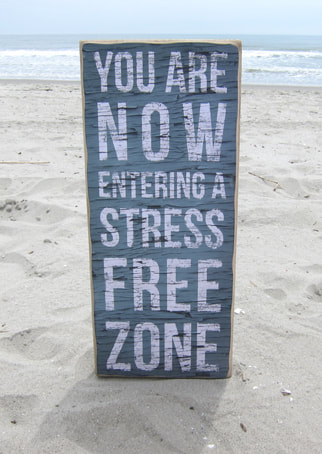 Updated from an earlier post dated June 2015, originally posted HERE “Breathing in, I calm my body. Breathing out, I smile. Dwelling in the present moment, I know this is a wonderful moment.” - Thich Nhat Hahn I start every bodywork session with by breathing, in sync with my client. I find that the simple act of conscious breathing being aware of "in breaths" and "out breaths" slows my mind, gets me prepared, and for the client on the table, simple directed breathing sets immediately the process of allowing oneself to let go of stress and begin to enter a state of relaxation. Truthfully, though I actually start every session with a speech! Not really a speech so much as a welcoming greeting, wherein I say "Welcome. Inside this space, is like a sanctuary. The phone gets turned off, and on the other side of that door - lay your obligations; the bills, the job, the kids, the illness, the whatever that calls to you, obligates you or otherwise demands your attention or creates your worries. Inside, here in this space is just the now. Bodywork with me starts with and is a form of meditation. Much is made of the capabilities of alternative therapies, but much of the evidence to support massage's meditation’s effectiveness in promoting mental or physical health isn’t quite up to snuff. Why? Many studies don’t include a good control treatment. But when researchers from Johns Hopkins University in Baltimore, MD sifted through nearly 19,000 studies, they found 47 trials that addressed those issues and met their criteria for well-designed studies. Their findings, published in JAMA Internal Medicine, suggest that mindfulness meditation can help ease psychological stresses like anxiety, depression, and pain. Dr. Elizabeth Hoge, a psychiatrist at the Center for Anxiety and Traumatic Stress Disorders at Massachusetts General Hospital and an assistant professor of psychiatry at Harvard Medical School, says that mindfulness meditation makes perfect sense for treating anxiety. “People with anxiety have a problem dealing with distracting thoughts that have too much power,” she explains. “They can’t distinguish between a problem-solving thought and a nagging worry that has no benefit.” “If you have unproductive worries,” says Dr. Hoge, you can train yourself to experience those thoughts completely differently. “You might think ‘I’m late, I might lose my job if I don’t get there on time, and it will be a disaster!’ Mindfulness teaches you to recognize, ‘Oh, there’s that thought again. I’ve been here before. But it’s just that—a thought, and not a part of my core self,'” says Dr. Hoge. One of her recent studies (which was included in the JAMA Internal Medicine review) found that a mindfulness-based stress reduction program helped quell anxiety symptoms in people with generalized anxiety disorder, a condition marked by hard-to-control worries, poor sleep, and irritability. People in the control group—who also improved, but not as much as those in the meditation group—were taught general stress management techniques. All the participants received similar amounts of time, attention, and group interaction. Positive Emotions Lead to Better Health: New research suggests that meditation, massage or any other mood-enhancing activity can serve as a nutrient for the human body. In recent years have psychologists begun to appreciate the benefits of happiness and positive emotion — benefits that include everything from enhanced creativity to improved immune-system function. Dr. Barbara Fredrickson at the University of North Carolina, a leader in the field of positive psychology, posed the question, “What good are positive emotions?” and came up with the following possibilities. Happiness broadens your focus and expands your thinking Positive emotions — curiosity, love, joy, contentment, wonder, excitement — expand your focus of attention. When you’re angry, your focus narrows to the source of your frustration and the object of your wrath. Your mind is like a heat-seeking missile, bent on destruction. Contrast this with what happens when you get excited about something — your mind opens up and there’s a free flow of ideas and intellectual possibility. Curiosity abounds. This is precisely why passion is so essential to artistic endeavors. This is also why you need a high positivity ratio in the workplace if you want a high rate of productivity and a healthy bottom line. When Psychologist Jon Kabat-Zinn and others studied the brain activity that accompanies this type of meditation, they found that it was the left frontal lobe of the brain that was literally turned on — the part that scientists refer to as the “happy brain.” Positive and negative emotions can’t exist at the same moment in time. Embracing one negates the other. Studies on touch have shown that something as simple as receiving a light touch hand from a compassionate friend or the act of petting your favorite animal can lower your blood pressure — so you can imagine the positive impact of the sustained and focused touch of massage - and, touch requires no prescription, nor has any negative side-effects. The next time you find yourself feeling negative — upset, angry, sad, or worried — try taking an hour or so for massage and see what happens — it may provide just the escape you need from those negative emotions. Aloha Update 9/17/2024 Every now and again, I look back on old blog posts and find one that deserves to bubble to the top again. Since writing this I have discovered a new author and lecturer worth listening to - his name is Dr. Gabor Mate. He is an author and lecturer and physician by training. A short video he made about stress can be found here - but please take a moment to listen to some of his thoughts, and or read any of his books. 5 Reasons why you shouldnt shop for a massage by price - and why massage DEALS end up being dealbreakersActually I have no real idea how many reasons there are, but titles like these on the internet seem to want to have a number, so 5 seemed like a good one. Maybe there are many more, or maybe just one - You get what you pay for. I was moved to write this post after looking at my ad-words and seeing that the most often used phrase that people search and click on is "massage deals near me" or something similar. Somewhere further down the list is "best massage therapist near me". I know that for some people money is tight, and many view massage as an indulgence, but here is the problem - Let's say you have saved up, you money is hard earned and you are ready to book your "treat". You go onto a deal site, look for the cheapest massage you can find 'cause hey "a massage is a massage" and you leave disappointed that it was such a mediocre experience. What do you expect? If someone is offering you something that should cost $150 or $200 or more for $65, honestly, do you really think you are going to get that elevated experience? This is not to put down therapists who do heavy discounting, or those who use these deals as a way to meet new clients, but it has been my experience that the Group-on type client will just go from therapist to therapist, carrying his or her dissatisfaction with them to the next therapist, never landing on anyone they return to, but more importantly never discovering the experience they have been looking for. It's a value proposition. Some clients would think nothing of spending $300 on a hair cut or color, $75,000 on a new car, $500 on shoes - but a massage ? Self care? Something that is experienced but can't be shared? Get the cheapest. NO. Many don't see the value in it and that is a shame - if this is you, you are missing out. Having said that, an expensive price doesn't always equate to a better massage either. It is a mistake to assume that just because the massage is being offered at a luxury hotel or spa that you are getting a top therapist. The most expensive hotels and luxury spas hire the same therapists that the mass franchise chains do. And sadly they get paid the same. So if you are paying $300 for your upscale experience, the therapist is still likely only getting $35 plus tips. The principal difference being that it is a beautiful setting with wonderful amenities usually, but not always. No extra care is put on the quality of the therapists.
So what do you do? Look for an independent therapist or smaller company. . Someone whose website resonates with what you are looking for. Look for someone that will take a thorough intake, listen to your needs, and refer you out if they don't feel they are the best match. Look at their offerings? Are they all over the map or do they seem to specialize. Look closely at sites that are too generic or broad - Deep tissue, Swedish Relaxation, Sports, Injury & Pain Management, Emotional Well being, Stress Management. I mix a variety of modalities to create a unique experience just for you" is the most over used phrase in bodywork. Massage is a big word and it means many things to many people. Its difficult to specialize in deep or rehab work as well as relaxation, stress management and emotional well being. They are at opposite ends of a spectrum. Next time you are ready to book a massage - try this experiment - Just once, look, really look for a therapist that stands out, look for the best fit, not the cheapest. I realize "the best" is subjective, but do a little homework, and search for someone, not based on price and book that one. Then see how you feel. AND - let me know here in the comments how it turns out. Good Luck! |
A Really Good Massage BlogAbout MeI write about things that I myself need to be mindful of. ways in which I would like to improve. It is not from the perspective of preaching - but rather writing helps me work out what I myself need to do - we are all in this together.
Archives
February 2024
Categories
All
|
AWARD WINNING
|
|
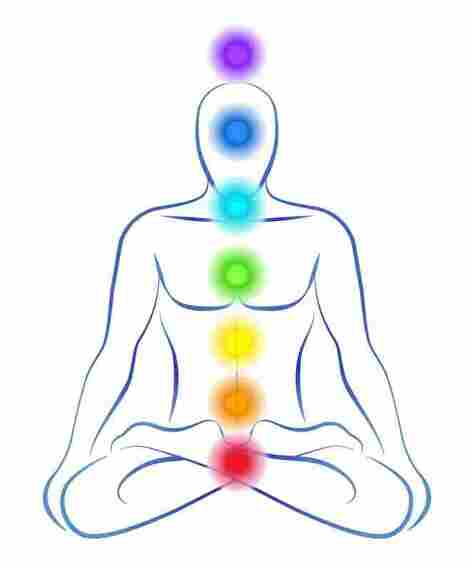
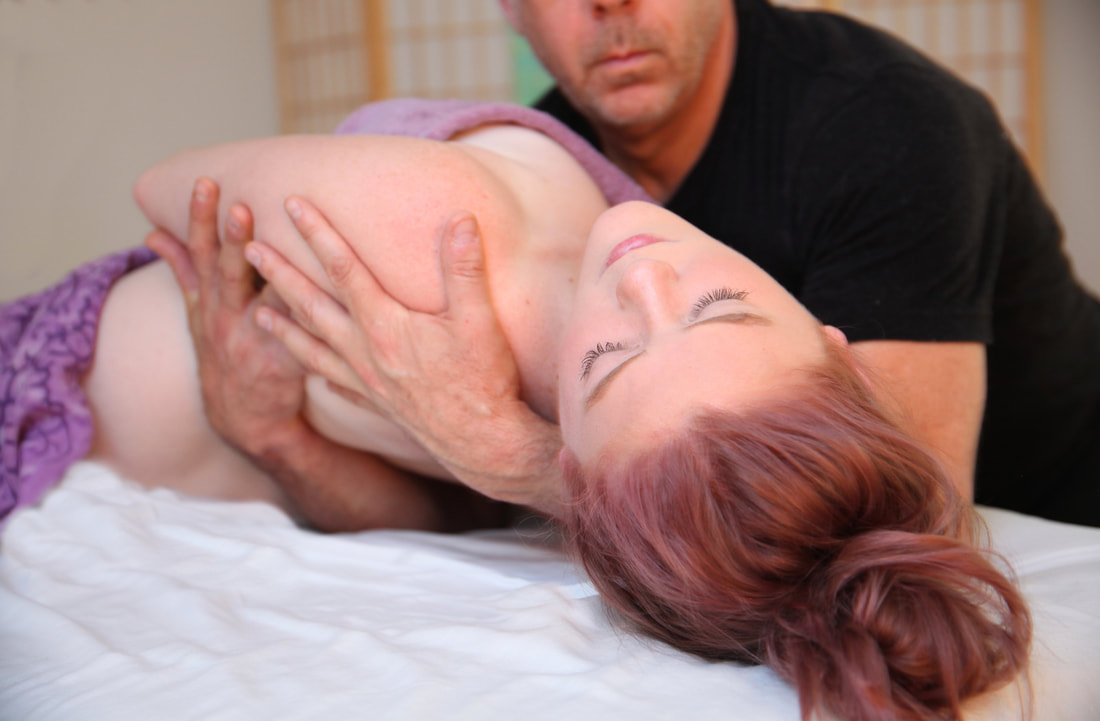
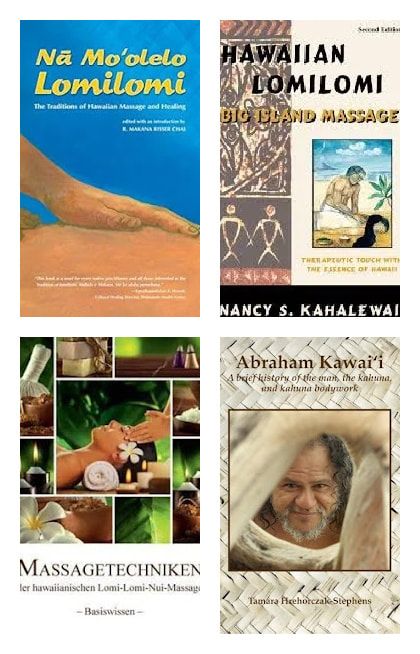
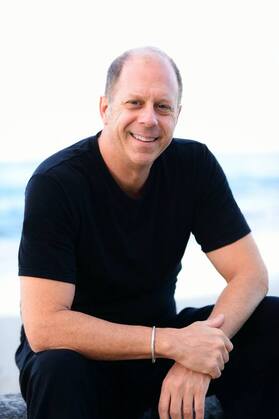
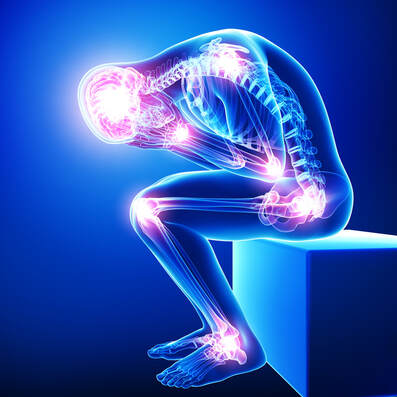
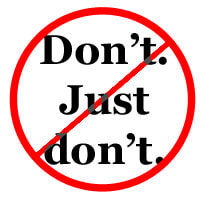
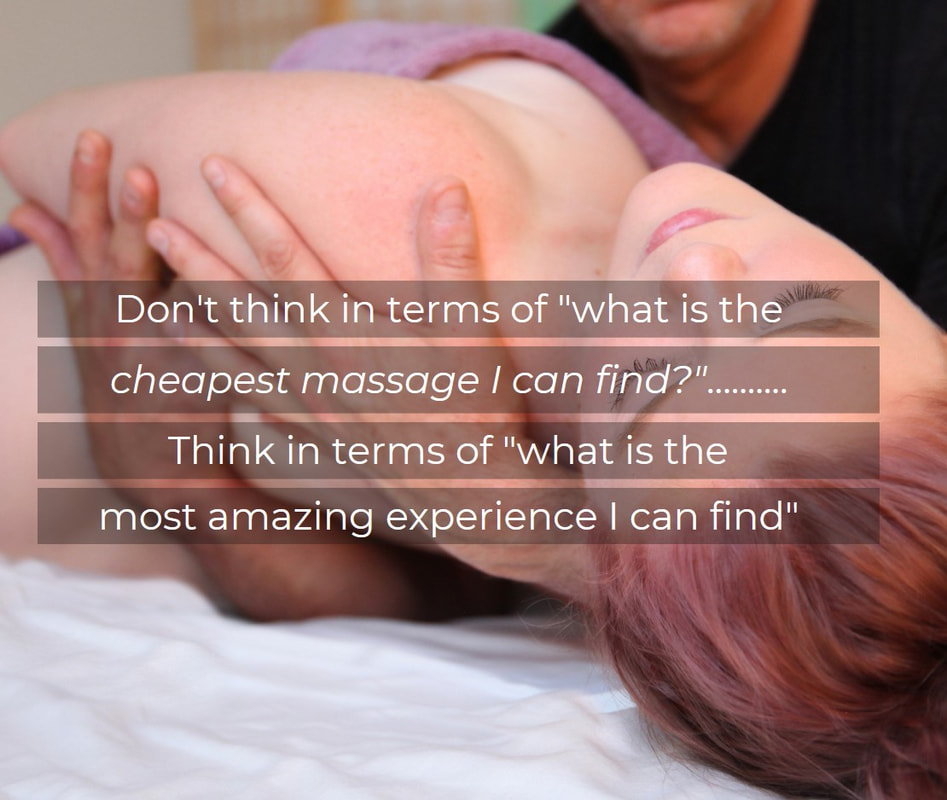
 RSS Feed
RSS Feed
